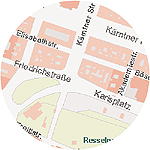Born as a son of Chinese immigrants in Vancouver
(Canada), Ken Lum has mainly worked with photography and
writing since the 1980ies. In a series of billboards he explores
the creative possibilities of advertising. The fact that
the artistic potential of photography has attracted the public’s
interest to a greater extent in the past fifteen years has
contributed to the growing international recognition of Ken
Lum. In the meantime, he ranks among the best known Canadian
artists and is usually mentioned in the same breath as Jeff
Wall.
In order to communicate on the level of our everyday experience
in dealing with the different forms of advertising in the
urban space, Ken Lum follows their aesthetics in his works,
yet,
at the same time, he draws on the publicly effective aspects
of Dada, Surrealism and Constructivism.
The use of mirrors combined with writings in the Westpassage
Karlsplatz in Vienna represents a further development of
Ken Lum’s oeuvre, which has, right from the beginning, circled
around issues of identity, language and culture. Here, in his
media installation “Pi”, Ken Lum deals with the
subject of statistics referring to the world with numerical
information.
14 mirrored panels are fixed to the side walls of the passageway,
each furnished with a piece of etched writing. LED displays
are mounted under each of these headlines. Based on statistical
data previously surveyed according to socio-scientific standards
as well as mathematical forecast models and their corresponding
algorithms, the numbers visualized there are constantly changing.
Ken Lum refers to an example, on which his idea is based
on: “In
New York, there is a large countup clock indicating the total
public debt of the USA, the numbers jumping up every second.”
Passers-by see themselves mirrored in the various panels
in the subterranean passageway below the Karlsplatz in Vienna.
While reading the up-to-date number on the digital counting
device, they are – as readers – being linked to
the number in a performative sense.
In his work “Pi” for the Westpassage Karlsplatz
Ken Lum calls his combination of text and statistical figures
a “factoid”.
|
 |
“Factoids” can either be countable
hard facts or trivial information translated into numbers. For
the most part we deal with concisely surveyed and complex
datasets where the difference between
local and global references is brought into play. The factoid “Number
of Schnitzels Eaten in Vienna since January 1“ not
only brings into play the ironic side of statistics but also
embodies a link to
the billboard series for the “Schnitzel Company“,
a fictional fast-food chain – a project sponsored by
the Chamber of Labour Vienna, with which Ken Lum was present
in Vienna’s urban space already in 2004.
Above the entrance area adjacent to the main
passageway there is a large-scale LED display which is
mounted behind semi-mirrored glass. Prominently positioned,
a fourteen-digit
counter visualizes permanently new combinations of digits
thus referring to the central theme of the entire installation.
Located in the central area of the pedestrian passageway
and as a symbol for the world, there is the representation
of the number Pi. This infinite decimal number is translated
into the wide screen format with 478 decimal places, whereby
the last currently calculated decimal places are visualized
on an LED display with the help of a computer program.
Moreover, an exhibition scenario featuring lexical and
statistical handbooks dealing with issues such as population
development or migration has been created in a free-standing
and transparent showcase located right at the turnoff toward
the Vienna Secession. In a similar way as in the so-called “factoids” the
mathematical problem of attribution is addressed here, which
in its political dimension corresponds to the global phenomenon
of migration as presence, affiliation and exclusion in Ken
Lum’s work.
The minimalism shaped by his approach to the mass media
and the concept art, which he has experienced in advertising,
enable Ken Lum to formulate complex sociopolitical interactions
effectively in public space.
bk
|


